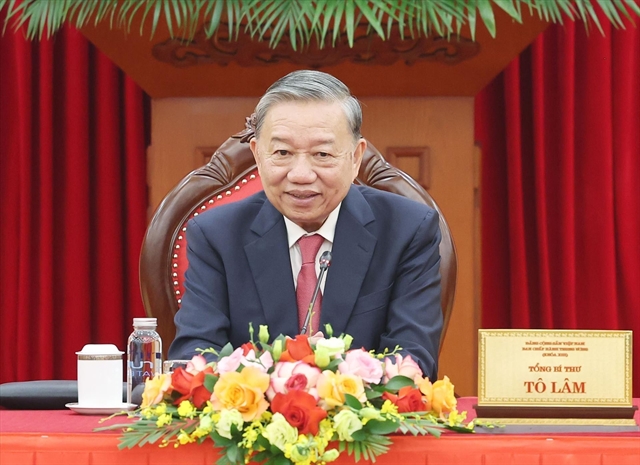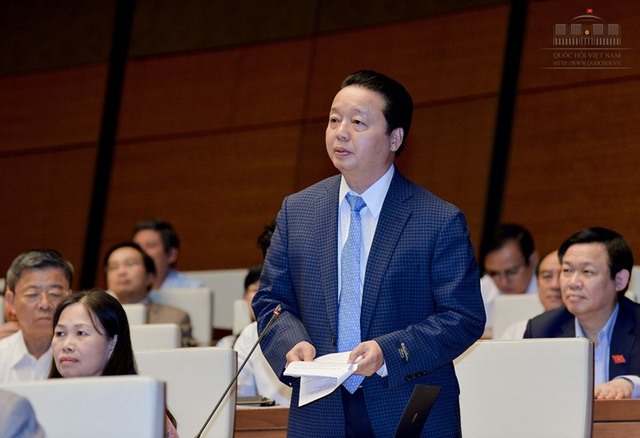 Politics & Law
Politics & Law

Poor management and planning was blamed for the increased environmental pollution in rural areas, trade villages and industrial zones in Việt Nam, the Minister of Natural Resources and Environment Trần Hồng Hà said at the National Assembly’s Q&A session yesterday afternoon.
 |
| Minister of Natural Resources and Environment Trần Hồng Hà at the National Assembly’s Q&A session yesterday afternoon.— Photo dantri.com.vn |
HÀ NỘI — Poor management and planning was blamed for the increased environmental pollution in rural areas, trade villages and industrial zones in Việt Nam, the Minister of Natural Resources and Environment Trần Hồng Hà said at the National Assembly’s Q&A session yesterday afternoon.
The minister said that rural and suburban areas were being strongly affected by urbanisation and industrial production activities, but infrastructure for waste collection and treatment was not receiving proper investment.
Just five per cent of industrial zones nationwide had waste water treatment systems. Similar systems were rarely available at trade villages. Since 2011, the Government has wanted to solve pollution problems at 34 key trade villages, but so far just nine out of the 34 villages have received funding to tackle environmental pollution.
Deputy Ma Thị Thúy from northern Tuyên Quang Province raised concerns over improperly collected and treated waste in urban areas, particularly used pesticide containers.
She asked for stronger actions from environment agencies.
Minister Hà said that the actions required joint efforts by other ministries including Agriculture and Construction.
For example, the agriculture ministry needs to speed up the programme to build new urban areas with environmental criterion engaging in the development of a proper system to collect and treat waste, calling for waste sorting at households. The construction ministry develops planning on waste treatment areas.
It is also needed to mobilise resources to tackle pollution and improve environmental protection from the State-budget, private sector and environment fees which were collected based on the ‘polluter pays’ principle – a commonly accepted practice that those who produce pollution should bear the costs of managing it to prevent damage to human health or the environment.
Deputy Phạm Đình Cúc from central Bà Rịa Vũng Tàu Province complained that when environmental pollution occurred, no person or agency claimed responsibility. The Law on Environment promoted people’s roles in overseeing environmental protection activities but they were unable to access information.
Minister Hà explained that the responsibilities must be pointed out in any environmental problem.
Specified functions and tasks of central agencies and local ones were not clearly defined, causing difficulties. Central agencies could not handle all the problems arising from localities, so local authorities played an important role in environmental control and protection.
“It is needed to decentralise and invest more in local agencies, particularly in human resources,” he said.
The Minister confirmed citizens’ right to live in a healthy environment and access environment information, but he admitted that they could not access the information properly because of ineffective communication activities.
Deputy Nguyễn Ngọc Phương from central Quảng Bình Province said that voters appreciated what the National Assembly and Government had done to tackle the environment disaster – mass fish deaths in four central provinces of Hà Tĩnh, Thừa Thiên Huế, Quảng Trị and Quảng Bình earlier this year.
“But voters are still worried about the environment now and in the future. What can be done to ensure that the polluter - Hưng Nghiệp Formosa Hà Tĩnh – will not pollute the environment again?”
Minister Hà said that the environment ministry is responsible for the Formosa incident.
As soon as the cause of the pollution was detected, the ministry set up a scientific council to assess and make plans, and required the polluter to have a road map for tackling the problems, particularly concentrated on three issues of waste water, gas emissions and solid waste.
“Formosa’s waste treatment is monitored, supervised and observed round the clock,” he said, adding that relevant data was transferred directly to Hà Tĩnh’s Environment Department and then the ministry.
The ministry asked the company to strictly follow Việt Nam’s technical standards. In case Việt Nam did not have some requirements, international ones would be applied.
The company was asked to build a 10-ha lake with bio indicators, raising fish and other marine creatures to test its waste water before it was discharged into the environment, he said.
The company was also asked to keep all of its solid waste at a storehouse before they found competent waste treatment companies. The waste could be studied for use in making building materials.
“In the next two years, Formosa must apply coke drying quenching (CDQ) instead of coke quenching technology,” he said.
Also yesterday afternoon, the Environment Minister talked about climate change response, the exploitation of natural resources and minerals including coal mining and its waste, and sand mining on rivers. As about 44 questions from deputies were sent to Hà, he would continue to be in the hot seat at today’s Q&A session. — VNS




